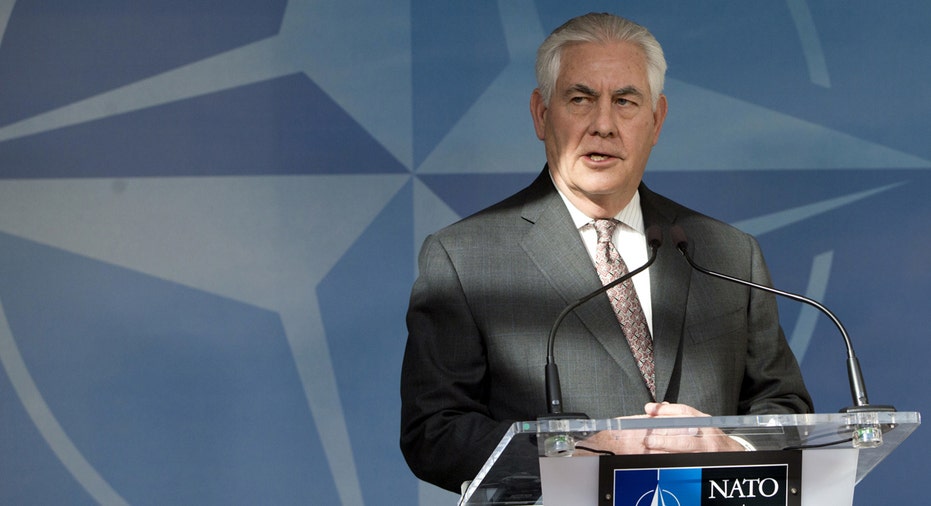Tillerson to NATO Members: Pay Up

Secretary of State Rex Tillerson attended his first meeting Friday with NATO’s foreign ministers in Brussels, where he took the opportunity to press members on their failure to meet their full financial obligations to the alliance.
"Our goal should be to agree at the May leaders meeting that by the end of the year all Allies will have either met the pledge guidelines or will have developed plans that clearly articulate how, with annual milestone progress commitments, the pledge will be fulfilled," Tillerson said.
While the summit was largely expected to focus on strengthening global security, the White House’s recent complaints about unfair burden sharing did not fall on deaf ears.
NATO Secretary General Jens Stoltenberg said this week ahead of the meeting that member defense spending contributions would be a part of the summit’s agenda.
“During [Friday’s] first working session we will look at how to further strengthen the transatlantic bond with more and better defense spending and fair burden-sharing across the alliance,†Stoltenberg said on Thursday.
President Donald Trump and his administration have been steadfast -- and vocal -- about their insistence that member states step up contributions to meet funding expectations, set at 2% of each country’s respective GDPs.
The United States contributed more than 22% of the organization’s budget in 2016, according to White House data, which constituted 3.6% of U.S. GDP at $664 billion, far outpacing all other members. Out of all 28 countries that belong to NATO, only five met the minimum contribution level last year—the U.S., Greece, the U.K., Estonia and Poland.
One of the notable exceptions to that list from Trump’s perspective is Germany. The president jabbed German Chancellor Angela Merkel during her visit to the White House earlier this month, deriding Berlin for its failure to reach NATO’s funding target. In 2016, Germany contributed $41.6 billion, just 1.2% of its GDP.
Despite what you have heard from the FAKE NEWS, I had a GREAT meeting with German Chancellor Angela Merkel. Nevertheless, Germany owes.....
— Donald J. Trump (@realDonaldTrump) March 18, 2017
...vast sums of money to NATO & the United States must be paid more for the powerful, and very expensive, defense it provides to Germany!
— Donald J. Trump (@realDonaldTrump) March 18, 2017
The United States’ relationship with NATO has been tense since President Trump took office. Trump has been a strong critic of the intergovernmental military-based alliance, which, just prior to his inauguration, he called “obsolete†for its failure to make substantial headway in the fight against terror. In July the then president-elect said he wouldn’t automatically defend fellow member nations who were not living up to their financial obligations, a clear violation of the organization’s communal agreement.
He has since somewhat softened his stance on NATO’s relevance, saying the administration “strongly supports†the alliance, both last month and again during his meeting with Merkel earlier in March.
Tillerson continued to reassure the foreign ministers on Friday that the U.S. would uphold agreements and ensure each member has the ability to defend itself.
“We understand that a threat against one of us is a threat against all of us, and we will respond accordingly. We will uphold the agreements we have made to defend our allies,†Tillerson said.
After rumors spread Tillerson intended to skip the summit, which was initially scheduled for April 5 around Chinese President Xi Jinping’s visit to Mar-a-Lago, the gathering was reportedly shifted to accommodate the U.S. leaders’ schedules.
"It became obvious that [date] didn't work for Secretary Tillerson," the NATO Secretary General told reporters in Brussels.
President Trump is set to attend the NATO summit in May.



















